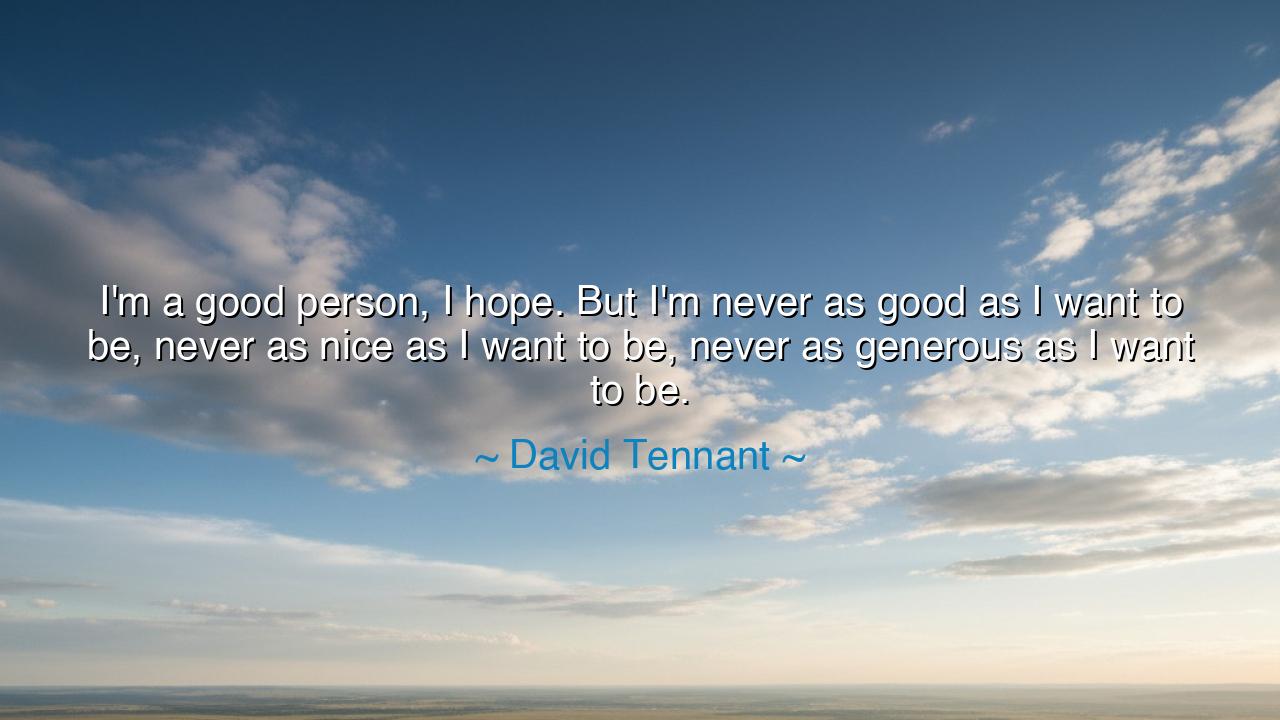
I'm a good person, I hope. But I'm never as good as I want to be
I'm a good person, I hope. But I'm never as good as I want to be, never as nice as I want to be, never as generous as I want to be.






“I’m a good person, I hope. But I’m never as good as I want to be, never as nice as I want to be, never as generous as I want to be.” — David Tennant
In these humble and heartfelt words, David Tennant, a man of art and conscience, speaks the ancient truth of the human soul — the eternal tension between who we are and who we wish to become. His confession is not one of guilt, but of awakening. When he says, “I’m a good person, I hope,” he does not claim perfection; rather, he reveals the nobility of one who strives, who knows that goodness is not a crown to be worn but a path that must be walked every day. This quote, simple in its phrasing, carries the weight of ages, for it echoes the wisdom of prophets, philosophers, and poets who have long taught that virtue is pursuit, not possession.
The ancients understood this struggle well. Socrates, the wisest of the Greeks, declared that the only true wisdom was to know one’s own ignorance. In that spirit, Tennant’s words are a modern echo of that ancient humility — a recognition that no man is ever as kind, as selfless, or as noble as his heart wishes him to be. To see one’s own shortcomings not with despair but with hope — this is the mark of the wise. For the unexamined man believes himself perfect, while the awakened soul sees his flaws and still chooses the upward path.
There is power in that yearning — the hunger to be better. It is the fire that forges the human spirit. The one who says, “I am enough,” begins to fade; but the one who says, “I can be more,” keeps the flame alive. When Tennant speaks of never being “as generous as I want to be,” he reveals the sacred restlessness that drives all true goodness. The saints and heroes of history were not born perfect — they were born restless. They looked upon their own failings and, instead of despairing, they labored to outgrow them. It is this divine dissatisfaction that transforms a life from mere existence into purpose.
Consider the example of Mahatma Gandhi, who once said, “I am painfully conscious of my imperfections, and therein lies all the strength I have.” Though revered as a saint, Gandhi saw himself as a man still in progress, still wrestling with pride, anger, and doubt. Yet it was that very honesty, that refusal to believe himself “good enough,” that made him strive for peace and compassion in every act. Like Tennant, Gandhi knew that to seek to be good is itself goodness, and that the journey toward virtue is what ennobles the soul.
Tennant’s words also remind us of the quiet battle within every heart — the war between our intentions and our actions. We wish to be patient, yet we grow angry. We wish to be kind, yet we turn away. We wish to be generous, yet fear whispers, “Hold back.” But these failures do not make us evil; they make us human. What matters is not that we fall short, but that we rise again, each day, and try once more. The beauty of humanity is not in its perfection, but in its persistence. As the poet once said, “The measure of a soul is not how pure it is, but how earnestly it strives toward the light.”
In a world that glorifies appearance and achievement, Tennant’s humility stands as a quiet act of rebellion. To admit imperfection is to stand naked before the truth — and to find, in that honesty, the roots of compassion. Those who know their own failings are gentler with the failings of others. Thus, self-awareness becomes the mother of empathy, and humility the foundation of goodness. The greatest kindness often comes from those who know how difficult it is to be kind.
Lesson:
The wisdom of David Tennant teaches us that goodness is not a destination but a daily practice. Do not despair when you fall short of your ideals; rejoice that you still feel their pull. Strive always to be kinder, even in small things — a word of patience, a gesture of mercy, a moment of gratitude. Do not measure yourself by perfection, but by your willingness to grow. Each day, let your heart whisper, “I am not yet who I wish to be — but I am trying.” For in that striving lies the essence of what it means to be human: flawed, striving, luminous, and alive with the eternal hope of becoming better than we were yesterday.






AAdministratorAdministrator
Welcome, honored guests. Please leave a comment, we will respond soon